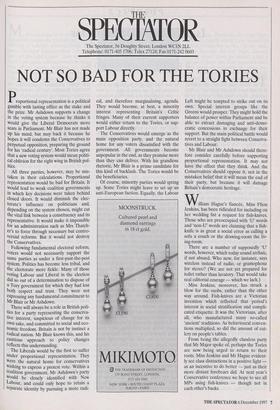SPECTATOR
The Spectator, 56 Doughty Street, London WC1N 2LL Telephone: 0171-405 1706; Telex 27124; Fax 0171-242 0603
NOT SO BAD FOR THE TORIES
Proportional representation is a political gamble with lasting office as the stake and the prize. Mr Ashdown supports a change in the voting system because he thinks it would give the Liberal Democrats more seats in Parliament. Mr Blair has not made up his mind, but may back it because he hopes it will condemn the Conservatives to perpetual opposition, preparing the ground for his 'radical century'. Most Tories agree that a new voting system would mean politi- cal oblivion for the right wing in British pol- itics.
All three parties, however, may be mis- taken in their calculations. Proportional representation would be bad for Britain. It would lead to weak coalition governments in which key decisions were taken behind closed doors. It would diminish the elec- torate's influence on politicians and, depending on the system chosen, might cut the vital link between a constituency and its representative. It would make it impossible for an administration such as Mrs Thatch- er's to force through necessary but contro- versial reforms. But it would not destroy the Conservatives.
Following fundamental electoral reform, voters would not necessarily support the same parties as under a first-past-the-post system. Politics has become less tribal, and the electorate more fickle. Many of those voting Labour and Liberal in the election did so out of a determination to dispose of a Tory government for which they had lost both respect and trust. They were not expressing any fundamental commitment to Mr Blair or Mr Ashdown.
There will always be a role in British poli- tics for a party representing the conserva- tive interest, suspicious of change for its own sake, and committed to social and eco- nomic freedom. Britain is not by instinct a radical nation. Mr Blair knows this, and his cautious approach to policy changes reflects this understanding.
The Liberals would be the first to suffer under proportional representation. They were the natural home for conservatives wishing to express a protest vote. Within a coalition government, Mr Ashdown's party would be closely identified with New Labour, and could only hope to retain a separate identity by pursuing a more radi-
cal, and therefore marginalising, agenda. They would become, at best, a minority interest representing Britain's Celtic fringes. Many of their current supporters would either return to the Tories, or sup- port Labour directly.
The Conservatives would emerge as the main opposition party, and the natural home for any voters dissatisfied with the government. All governments become unpopular in the end, as they promise more than they can deliver. With his grandiose rhetoric, Mr Blair is a prime candidate for this kind of backlash. The Tories would be the beneficiaries.
Of course, minority parties would spring up. Some Tories might leave to set up an anti-European faction. Equally, the Labour
Left might be tempted to strike out on its own. Special interest groups like the Greens would prosper. They might hold the balance of power within Parliament and be able to extract damaging and anti-demo- cratic concessions in exchange for their support. But the main political battle would revert to a straight fight between Conserva- tives and Labour.
Mr Blair and Mr Ashdown should there- fore consider carefully before supporting proportional representation. It may not have the effect that they think. And the Conservatives should oppose it, not in the mistaken belief that it will mean the end of their party, but because it will damage Britain's democratic heritage.
William Hague's fiancée, Miss Ffion Jenkins, has been ridiculed for including on her wedding list a request for fish-knives. Those who are preoccupied with 'II' words and `non-U' words are claiming that a fish- knife is as great a social error as calling a sofa a couch or the drawing-room the liv- ing-room.
There are a number of supposedly 'LI' words, however, which today sound archaic, if not absurd. Who now, for instance, says wireless instead of radio, or gramophone for stereo? (We are not yet prepared for toilet rather than lavatory. That would take real editorial courage — which we lack.) Miss Jenkins, moreover, has struck a blow for the snobs, rather than the other way around. Fish-knives are a Victorian invention which reflected that period's interest in social stratification and compli- cated etiquette. It was the Victorians, after all, who manufactured many so-called `ancient' traditions. As behavioural conven- tions multiplied, so did the amount of cut- lery on people's tables.
From being the allegedly classless party that Mr Major spoke of, perhaps the Tories are now being urged to return to their roots. Miss Jenkins and Mr Hague evident- ly see class distinctions in a positive light as an incentive to do better — just as their more distant forebears did. At next year's Conservative conference we hope to see all MPs using fish-knives — though not in each other's backs.


















































































 Previous page
Previous page